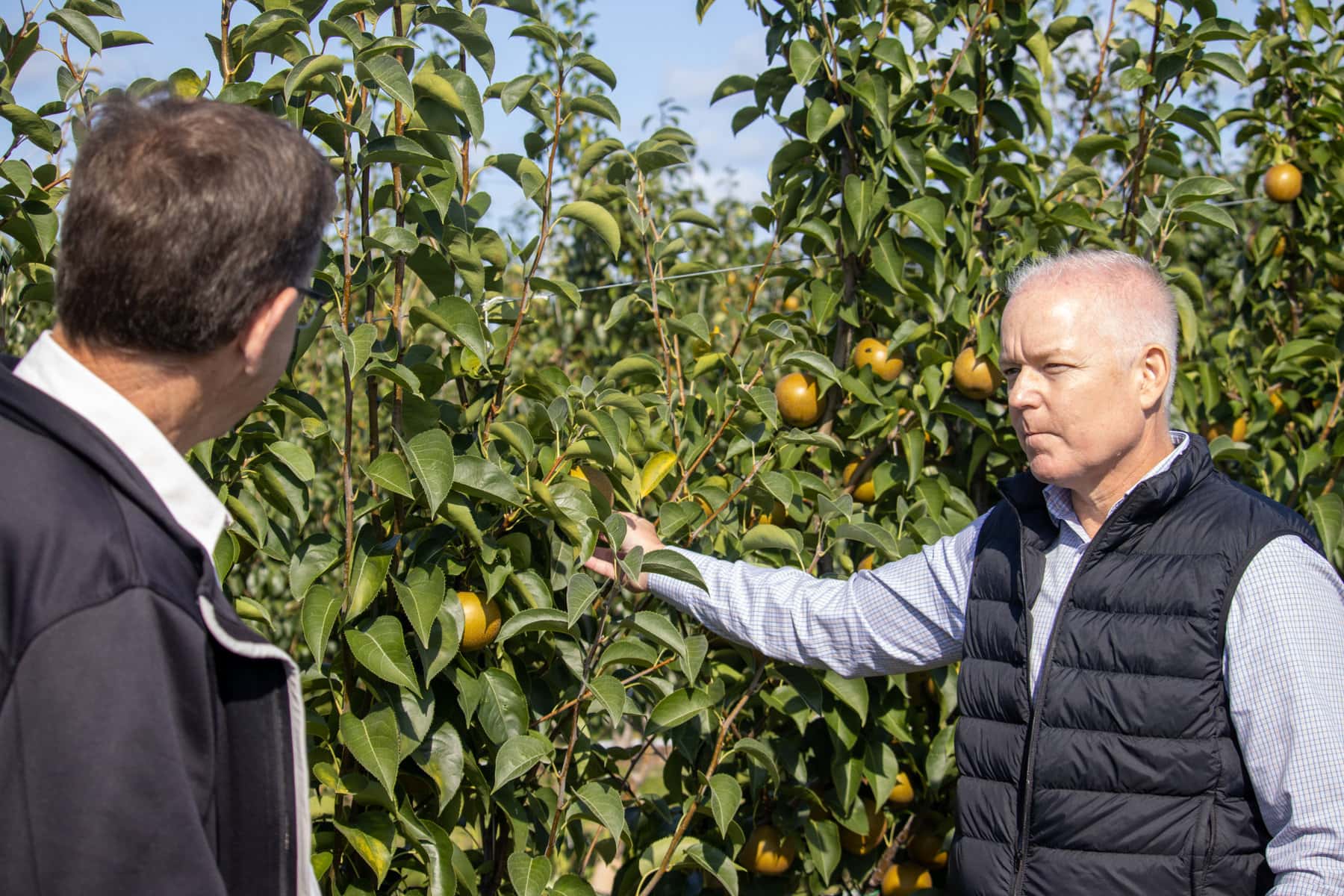22,000 Asian pear trees at Thwaites orchard in NOTL an example of project’s success
If there’s one thing Niagara is known for, it’s the amount of delicious tender fruits and fresh grapes the region produces each year.
Now, due to the success of the Ontario Tender Fruit Tree and Vine Program, shoppers will be able to add some new fruit varieties to their shopping carts.
The program started in 2016 and is funded by the Greenbelt Foundation and Greenbelt Fund, and works in partnership with the Ontario Tender Fruit Growers.
It focuses on creating new varieties of tender fruits and fresh grapes that can withstand extreme weather conditions due to climate change.
In turn, the new varieties will increase yields and provide fresh, local fruit while helping the economy.
“At the end of the day, there’s a lot of great agricultural land in Ontario, but few areas can match the potential of Niagara,” said Edward McDonnell, the CEO of the Greenbelt Foundation.
The funding provided by the Greenbelt Foundation covers up to 30 per cent of new, eligible tender fruit trees and fresh grape vines.
“So depending on what a grower plants, they could be receiving that cap up to 30 per cent, or an overall cap so that we make sure there’s money available to all the growers that apply,” said Sarah Marshall, manager of Ontario Tender Fruit Growers.
To showcase the program, a reception and orchard tour was hosted at John Thwaites’ High Density Pear Orchard in Niagara-on-the-Lake last Thursday morning.
Thwaites’ farm has planted more than 22,000 high-density Asian pear trees. High-density means the trees are planted closer together.
He received funding from the program, which helped him with the initial planting of the Asian pears, he said.
The idea of planting high-density pears is newer. Normally, pears would be planted 15 to 20 feet apart. Thwaites’ trees are planted four to 12 feet apart, resulting in 900 Asian pear trees to the acre.
“They had a pretty nice crop last year. And they had a little bit the year before,” Thwaites said of the pears. This year, he’s predicting the harvest will be double last year’s.
Asian pears are circular in shape, and more acidic and watery than other pear types.
“I’m told that ours are sweeter than the ones that come from China,” Thwaites told the crowd.
It can take anywhere from 10 to 15 years before a tender fruit variety makes it to the marketplace. An evaluation committee puts the varieties through an extensive process to make sure they suitable for Ontario growers.
Ontario Tender Fruit Growers also works with the University of Guelph and the Vineland Research and Innovation Centre throughout the process.
The program has helped more than 90 growers in Ontario, many of them from Niagara. This year alone, Ontario residents have access to more than 10 million pounds of tender fruit.
“It’s fantastic,” McDonnell said after seeing the program in action at Thwaites’ orchard on Townline Road.
“We spend a lot of time sort of understanding it conceptually. But then you come out to a place like Niagara into an orchard like this, and it kind of really warms the heart,” he said.
More than $450,000 in funding was provided in 2016 and 2018. The money meant more than 212,000 new trees – like peach, nectarine, plum and pear trees – were planted.
The Greenbelt Foundation is mainly funded by the province of Ontario, said McDonnell.
For the 2021 to 2023 period, the foundation has contributed an additional $286,000, which will help plant 75,000 new tender fruit trees.
It will also be used for 10,000 new grape vines in Niagara.
This year, there were 63 different types of peach varieties planted and 15 different types pears.
There’s about a $25 million economic impact because of this program, said Marshall.
That’s not only the growers, she said, but it’s the marketers and retailers, too.
The program, which also helps attract new growers, has generated 335 full-time jobs, as well as $6.9 million in tax revenue, according to a news release from the Greenbelt Foundation.
The juniper grape is something new the Ontario Tender Fruit Growers are trying to commercialize, said Marshall. She said many farmers who don’t grow grapes or tender fruit are showing interest in the juniper vine.
“It’s attracting new growers to the industry as well, which is really cool,” she said.
The Greenbelt consists of 2 million acres of protected land. It not only protects farmland but also protects forests, wetlands, rivers and lakes.
The Niagara tender fruit and grape area is one of two specialty crop areas in Ontario, the other one being the Holland Marsh. Both areas are protected by the Greenbelt.
The foundation will continue to look for other opportunities in Niagara or along the Greenbelt to support agricultural activity, said McDonnell.
“Because we always say, you know, the Greenbelt only works if it works for the people in the Greenbelt.”











